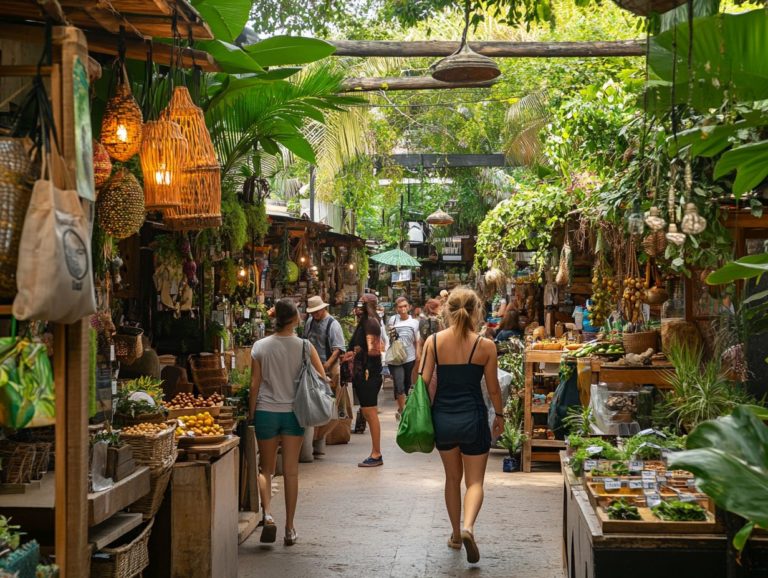10 Essential Tips for Sustainable Travel
Traveling sustainably goes beyond being trendy; it is a vital way to explore the world while protecting its beauty and resources for future generations. Embracing sustainable travel practices is crucial for all conscious travelers.
This article presents 10 essential eco-friendly tips to help you make environmentally responsible choices during your journeys. From selecting eco-friendly transportation options to supporting local communities, each tip empowers you to minimize your impact while enhancing your travel experience.
Embrace sustainable travel practices that benefit you and nurture the planet.
Contents
- Key Takeaways:
- 1. Choose Eco-Friendly Transportation Options
- 2. Stay in Sustainable Accommodations
- 3. Reduce Your Carbon Footprint
- 4. Support Local Businesses and Communities
- 5. Conserve Water and Energy
- 6. Pack Reusable and Eco-Friendly Items
- 7. Minimize Waste and Dispose of It Properly
- 8. Respect the Local Culture and Environment
- 9. Educate Yourself and Others About Sustainable Travel
- 10. Offset Your Carbon Emissions
- Why Is Sustainable Travel Important?
- How Can Sustainable Travel Benefit Local Communities?
- What Are the Environmental Impacts of Unsustainable Travel?
- How Can Travelers Incorporate Sustainable Practices into Their Trips?
- What Are Some Common Misconceptions About Sustainable Travel?
- What Are Some Examples of Sustainable Travel Destinations?
- Frequently Asked Questions
- What are the top 10 essential tips for sustainable travel?
- Why is sustainable travel important?
- How can I choose eco-friendly accommodations and support green business travel?
- What can I do to conserve water and electricity while traveling and utilize public transportation effectively?
- How can I offset my carbon footprint while traveling?
- What are some sustainable activities I can participate in while traveling?
Key Takeaways:

- Choose eco-friendly transportation options to reduce your carbon footprint.
- Support local businesses by staying in sustainable accommodations and buying from local vendors.
- Educate yourself and others about sustainable travel and its benefits for the environment and local communities.
1. Choose Eco-Friendly Transportation Options
Choosing sustainable transportation options is essential because your travel choice significantly impacts your carbon footprint. By using public transportation like FlixBus or Megabus, you save money and help reduce the number of vehicles on the road. This action eases congestion and cuts pollution.
Carpooling is another excellent way to share rides, maximizing occupancy while minimizing emissions. Rideshare services now often include electric vehicles, allowing you to choose greener options.
Transitioning to energy-efficient vehicles, such as hybrids, whether you own or rent them, amplifies the positive effects of your choices. Every trip can help build a sustainable future!
Collectively, these options empower you to contribute to environmental preservation and support local businesses while navigating urban landscapes.
2. Stay in Sustainable Accommodations
Staying in eco-friendly hotels is vital for eco-conscious travelers who want to minimize their environmental impact while enjoying their stay. Eco-friendly hotels often implement recycling programs, energy-efficient lighting, and certifications from organizations like EarthCheck and LEED, demonstrating their dedication to sustainability.
These establishments typically incorporate water conservation measures, such as low-flow fixtures and greywater recycling systems, which significantly reduce water usage and uphold conservation efforts. They prioritize sourcing food and materials locally, supporting nearby communities and reducing transportation emissions.
For travelers eager to make environmentally conscious choices, identifying hotels with these certifications simplifies the booking process. As awareness about sustainability grows, now is the perfect time to make eco-friendly travel choices!
Many hotels are enhancing their eco-friendly reputation with waste reduction initiatives, contributing to environmental preservation.
3. Reduce Your Carbon Footprint
Reducing your carbon footprint is an essential aspect of sustainable travel, as it involves making deliberate choices that minimize the environmental impact of your journeys. Whether you select direct flights to cut down on emissions or practice flight shaming to encourage eco-friendly behavior, every little effort contributes to meaningful conservation efforts.
You can explore greener alternatives by opting for train journeys instead of air travel. This not only slashes emissions but often treats you to breathtaking views that flying simply can t match, making it a form of ground travel.
Carpooling with friends or family is another effective strategy. Sharing a ride reduces gasoline consumption and enhances your travel experience through shared camaraderie, aligning with the principles of travel responsibly.
Use public transportation like buses or trams to lower carbon emissions caused by personal vehicles, which contributes to sustainable travel. Your choices matter! They create a ripple effect that encourages more sustainable travel practices. When you make mindful decisions, you contribute to a collective movement that can drive remarkable changes in travel practices and encourage providers to embrace more sustainable operations.
4. Support Local Businesses and Communities
Supporting local businesses and communities is essential to your sustainable travel journey, as it not only fosters economic growth but also helps preserve cultural heritage. By engaging with local artisans and purchasing products sourced from the area, you can actively contribute to environmental initiatives while ensuring that your travels benefit the communities you visit.
Dining at family-owned restaurants invites you to experience authentic regional flavors, all while creating jobs and sustaining the livelihoods of local chefs and farmers and supporting local artisans.
Exploring artisan markets allows you to discover unique handcrafted items, directly supporting the artists behind their craft and contributing to the environmental initiatives of local cultures.
Participating in community events immerses you in the local culture, offering valuable insights into the area’s traditions and values while promoting cultural exchange and supporting local businesses.
Act now! Every action counts in preserving local culture and ensuring your travel experiences are both fun and responsible while contributing to environmental initiatives.
5. Conserve Water and Energy
Conserving water and energy during your travels is essential for embracing sustainable tourism, especially since these precious resources are often overexploited in popular tourist destinations. Simple actions, such as choosing energy-efficient lighting lights that use less power without sacrificing brightness in your accommodations and being mindful of your water usage can make a significant difference in environmental initiatives and help protect the environment.
Limit your shower time to five minutes and remember to turn off lights and electronics whenever you leave your room, reflecting an environmentally conscious mindset. Opt for accommodations with certifications that show hotels are eco-friendly, not only ensuring lower energy consumption but also supporting hotels that prioritize eco-friendly practices.
By making these thoughtful choices, you not only reduce your own carbon footprint but also contribute to the well-being of local ecosystems, which is essential for environmental initiatives. These small adjustments help preserve water sources, minimize pollution, and promote responsible tourism, ensuring that future generations can revel in the beauty of destinations around the globe while learning to reduce plastic waste.
6. Pack Reusable and Eco-Friendly Items

Packing reusable bags and eco-friendly items is not just a trend; it’s a cornerstone of sustainable travel. By minimizing waste and cutting down on plastic consumption, you significantly impact the environment.
Utilizing reusable bags, multi-purpose toiletries like Castile soap and coconut oil, and a trusty reusable water bottle benefits the environment and elevates your travel experience. It fosters a more organized and mindful approach.
Consider including bamboo cutlery, stainless steel straws, and cloth napkins in your packing list. These items can seamlessly replace pesky single-use plastic products that often appear during meals.
These eco-friendly strategies not only reduce your environmental footprint but can also lead to financial savings. Many cafes and restaurants offer discounts to patrons who bring their reusable cups or reusable bags.
The conscious choices you make while traveling forge a deeper connection with the destinations you explore. They inspire a sustainable lifestyle that resonates with the values of environmentally conscious travel.
7. Minimize Waste and Dispose of It Properly
Minimizing waste and ensuring proper disposal is essential for sustainable travel. Careless waste management can lead to serious environmental harm.
By being mindful of your waste management practices like recycling and composting you actively protect nature and local communities.
These thoughtful choices enhance your travel experience and contribute positively to the well-being of the destinations you visit. For example, using reusable water bottles and shopping bags drastically reduces reliance on single-use plastics, a significant pollutant in popular tourist areas.
Seek local recycling programs to contribute positively while you explore new places and support the local community.
Before setting off, research the waste disposal options available at your destination. This ensures responsible waste management, reinforcing your commitment to travel responsibly.
Every small step you take as a traveler creates a monumental impact, fostering healthier environments and promoting sustainable tourism practices.
8. Respect the Local Culture and Environment
Respecting the local culture and environment is a cornerstone of sustainable travel. It ensures that your journeys do not jeopardize the very places and communities that draw you in.
By embracing responsible travel practices, you foster positive relationships and bolster conservation efforts.
Make a difference by learning a few basic phrases in the local language. This effort bridges cultural gaps and shows respect for the community.
Engaging in local traditions, like participating in festivals or craft workshops, enriches your experience and supports local artisans economically.
Opt for eco-friendly accommodations and observe wildlife from a respectful distance. This showcases your commitment to preserving natural habitats.
By practicing mindfulness and understanding, you honor the rich tapestry of diverse cultures and the delicate ecosystems you encounter on your travels.
9. Educate Yourself and Others About Sustainable Travel
Educating yourself and others about sustainable travel is essential for cultivating a deeper understanding of eco-friendly practices and their benefits. By sharing your insights and eco-friendly tips, you can raise awareness and encourage group efforts to protect the environment that genuinely make a difference.
To broaden your knowledge, an abundance of resources awaits you. Books dedicated to responsible tourism provide practical advice, while documentaries vividly illustrate the urgent need for change. Engaging in workshops, whether online or in-person, allows you to connect with experts who focus on sustainable practices in the travel industry. Engaging the local community in discussions about responsible tourism amplifies these vital messages, creating a shared awareness.
When you actively participate in events or discussions, you nurture a sense of belonging and inspire others to reflect on the impact of their travel choices. This shared journey empowers communities to champion sustainability together!
10. Offset Your Carbon Emissions
Offsetting your carbon emissions is a vital step in sustainable travel, empowering you to counterbalance your environmental impact. By investing in projects aimed at reducing emissions like reforestation or renewable energy initiatives you can make a meaningful contribution to conservation efforts while savoring your journey.
Many travelers are now exploring various pathways to neutralize their footprints, such as participating in carbon offset programs that track funding directed toward eco-friendly projects. These programs often involve investing in wind farms, solar energy endeavors, or community-based initiatives that enhance biodiversity. Each choice you make plays an important role in fostering environmental stewardship and elevating awareness around the urgent issue of climate change.
By making these conscious decisions, you not only support sustainable practices but also become a catalyst for broader ecological efforts, benefiting the planet long after your trip has concluded.
Why Is Sustainable Travel Important?
Sustainable travel is essential for preserving our planet, allowing future generations to savor its natural wonders and cultural treasures. As tourism continues to flourish, the urgency to adopt responsible practices becomes more pronounced. Engaging in sustainable travel not only helps reduce emissions but also actively supports local communities and fosters conservation efforts that protect biodiversity and habitats.
By embracing eco-friendly practices, you can play an important role in preventing the degradation of stunning landscapes while simultaneously contributing to the local economy. Consider initiatives like community-based tourism in Costa Rica, which enable you to connect with local cultures and immerse yourself in nature without causing harm to the environment.
Eco-lodges in Africa exemplify how responsible tourism can create jobs and invest in conservation, showcasing the direct benefits that tourism can bring to local populations. These methods help preserve the rich heritage and beauty of destinations, allowing you to appreciate them in a way that honors both the environment and the communities that call these places home.
Join the movement for sustainable travel today!
How Can Sustainable Travel Benefit Local Communities?

Sustainable travel holds the potential to profoundly benefit local communities by driving economic growth and fostering meaningful cultural exchange. When you choose to support local businesses, you re not just a visitor; you re contributing directly to the economy, creating jobs, and encouraging crucial conservation efforts that protect local heritage and environments.
This approach to travel nurtures a sense of pride among residents, as they have the opportunity to showcase their rich culture and traditions to you, the traveler. Initiatives like community-run guesthouses and artisan markets provide local artisans a platform to share their crafts, leading to a revival of cherished traditional practices.
In Costa Rica, eco-lodges offer stunning views and thrilling wildlife experiences! They partner with locals to engage in wildlife conservation, ensuring that both the environment and the community thrive. By making intentional choices during your travels, you can play a vital role in sustaining the uniqueness and vitality of these remarkable destinations.
What Are the Environmental Impacts of Unsustainable Travel?
Unsustainable travel harms our environment. Act now to preserve it for future generations! Unsustainable travel practices can lead to serious environmental consequences, widening your carbon footprint, which measures the amount of greenhouse gases you create, while contributing to habitat destruction, pollution, and the loss of biodiversity. These effects underscore the pressing necessity for conservation efforts and responsible tourism that places environmental health at the forefront.
Take mass tourism, for example; it’s been linked to rising greenhouse gas emissions. Air travel alone accounts for nearly 2.5% of global emissions, and that number is projected to climb. Meanwhile, coastal ecosystems, particularly coral reefs, are suffering greatly from the increased boat traffic and pollution caused by tourist activities. Studies reveal that 50% of the world s reefs are currently under threat.
In local communities, unsustainable tourism often leads to resource depletion. Overfishing in popular areas has resulted in a staggering 70% decline in fish populations, severely affecting livelihoods and food security. These concerning statistics highlight the urgent need for you to reflect on your environmental footprint and champion eco-friendly initiatives that benefit both nature and local communities.
How Can Travelers Incorporate Sustainable Practices into Their Trips?
You can easily weave sustainable practices into your travels by making thoughtful choices that showcase your dedication to eco-friendly exploration. Here are some key actions you can take:
- Choose environmentally friendly places to stay.
- Use public transport, bike, or walk.
- Dine at local, sustainable restaurants.
Start by selecting hotels that prioritize green certifications and sustainable initiatives, helping to reduce your carbon footprint. Regarding transportation, opting for public transit, biking, or walking not only minimizes your environmental impact but also enriches your experience of the destination. Dining at restaurants that source ingredients locally or adhere to sustainable farming practices further elevates your commitment to responsible tourism.
By incorporating these simple yet significant choices, you ll find that your journeys are more fulfilling while also playing a vital role in promoting positive change for the environment and local communities.
What Are Some Common Misconceptions About Sustainable Travel?
You might think sustainable travel costs a lot or is inconvenient. In reality, eco-friendly tips can fit into any adventure and won’t break the bank.
Consider opting for public transportation or biking instead of rental cars. This choice slashes your carbon footprint and can save you some cash while immersing you in a more authentic local experience.
Dining at local eateries that prioritize sustainably sourced ingredients can often be more budget-friendly than overpriced chain restaurants, all while supporting the community you re exploring.
For places to stay, look into eco-lodges or hostels. They frequently offer competitive rates and unique attractions that you won t find elsewhere. By debunking these misconceptions, you can discover that sustainable travel is an exciting opportunity to explore while protecting our planet!
What Are Some Examples of Sustainable Travel Destinations?
Many destinations across the globe exemplify sustainable travel through their commitment to conservation and support for local businesses. Places renowned for their eco-friendly initiatives not only draw visitors but also champion environmental stewardship and cultural preservation.
Take Costa Rica, for example. It shines with its extensive national parks that protect diverse ecosystems while inviting eco-tourists to embark on guided hikes and wildlife tours.
Cities like Amsterdam embrace bike-sharing programs and sustainable transport systems to reduce carbon footprints, encouraging you to navigate the city s charming canals using eco-friendly options.
Then there s Bali, where a community-based tourism approach empowers local artisans and preserves traditional practices. It invites you to engage with nature in a responsible manner, encouraging you to use reusable bags.
These examples illustrate how destinations intricately weave sustainability into their essence, offering unforgettable experiences for conscious travelers who support conservation efforts.
Frequently Asked Questions
To further enhance your commitment to sustainable travel, consider these eco-friendly tips to make a positive impact during your trips.
What are the top 10 essential tips for sustainable travel?

The top 10 essential tips for sustainable travel are:
- Choose eco-friendly accommodations.
- Use public transportation or walk/bike instead of renting a car.
- Pack a reusable water bottle and utensils.
- Support local businesses and buy locally made products.
- Dispose of waste properly and recycle when possible.
- Conserve water and electricity.
- Respect the local culture and customs.
- Choose activities that positively impact the environment and community.
- Offset your carbon footprint by using practices that discourage unnecessary flights.
- Spread awareness and educate others about sustainable travel.
Why is sustainable travel important?
Sustainable travel is crucial because it helps minimize the negative impact of tourism on the environment and local communities. It promotes responsible and ethical travel practices, preserving cultural heritage and natural resources for future generations.
How can I choose eco-friendly accommodations and support green business travel?
To choose eco-friendly accommodations, look for certifications such as LEED or Green Key. These indicate that the establishment follows sustainable practices. Opt for places that use renewable energy, have energy-efficient lighting, and support local initiatives like EarthCheck or Green Globe.
What can I do to conserve water and electricity while traveling and utilize public transportation effectively?
To conserve water and electricity while traveling, follow these tips:
- Turn off lights and electronics when not in use.
- Take shorter showers and reuse towels.
- Unplug chargers and devices when not in use.
- Choose accommodations that use renewable energy sources, such as those certified by Rainforest Alliance or Green Seal.
How can I offset my carbon footprint while traveling?
Support carbon offset projects to reduce your carbon footprint. These projects fund initiatives that help the environment.
Choose eco-friendly transportation and activities to further reduce your carbon footprint.
What are some sustainable activities I can participate in while traveling?
Here are exciting sustainable activities to try while traveling:
- Hiking or biking tours.
- Volunteering with local conservation or community projects.
- Visiting and supporting sustainable and ethical animal sanctuaries responsibly.
- Attending cultural festivals and events.
- Learning about and supporting local indigenous communities and their crafts.






